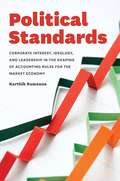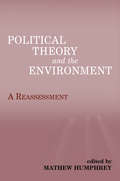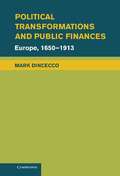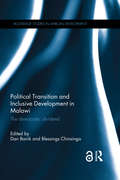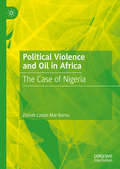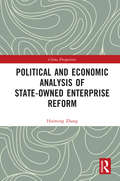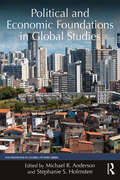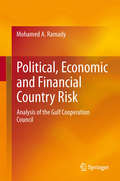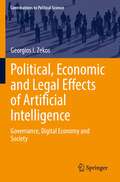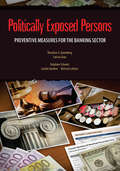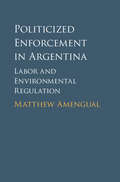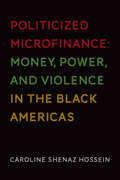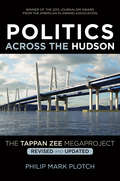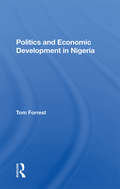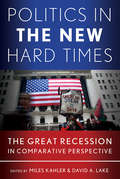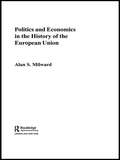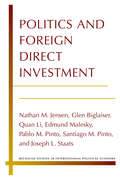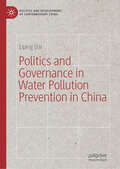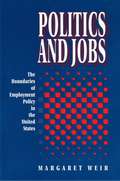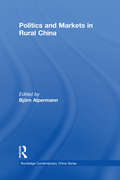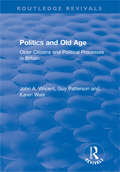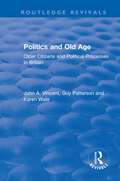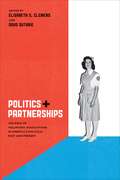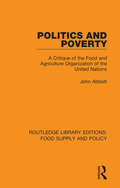- Table View
- List View
Political Standards: Corporate Interest, Ideology, and Leadership in the Shaping of Accounting Rules for the Market Economy
by Karthik RamannaPrudent, verifiable, and timely corporate accounting is a bedrock of our modern capitalist system. In recent years, however, the rules that govern corporate accounting have been subtly changed in ways that compromise these core principles, to the detriment of the economy at large. These changes have been driven by the private agendas of certain corporate special interests, aided selectively—and sometimes unwittingly—by arguments from business academia With Political Standards, Karthik Ramanna develops the notion of “thin political markets” to describe a key problem facing technical rule-making in corporate accounting and beyond. When standard-setting boards attempt to regulate the accounting practices of corporations, they must draw on a small pool of qualified experts—but those experts almost always have strong commercial interests in the outcome. Meanwhile, standard setting rarely enjoys much attention from the general public. This absence of accountability, Ramanna argues, allows corporate managers to game the system. In the profit-maximization framework of modern capitalism, the only practicable solution is to reframe managerial norms when participating in thin political markets. Political Standards will be an essential resource for understanding how the rules of the game are set, whom they inevitably favor, and how the process can be changed for a better capitalism.
Political Theory and the Environment: A Reassessment
by Mathew HumphreyThis collection offers a sympathetic but critical perspective on contemporary ecological political theory, and gives proposals for a reorientation of some of its key aspects.
Political Transformations and Public Finances
by Mark DinceccoHow did today's rich states first establish modern fiscal systems? To answer this question, Political Transformations and Public Finances by Mark Dincecco examines the evolution of political regimes and public finances in Europe over the long term. The book argues that the emergence of efficient fiscal institutions was the result of two fundamental political transformations that resolved long-standing problems of fiscal fragmentation and absolutism. States gained tax force through fiscal centralization and restricted ruler power through parliamentary limits, which enabled them to gather large tax revenues and channel funds toward public services with positive economic benefits. Using a novel combination of descriptive, case study and statistical methods, the book pursues this argument through a systematic investigation of a new panel database that spans eleven countries and four centuries. The book's findings are significant for our understanding of economic history and have important consequences for current policy debates.
Political Transition and Inclusive Development in Malawi: The democratic dividend (Routledge Studies in African Development)
by Dan Banik Blessings ChinsingaMalawi is among the few countries in sub-Saharan Africa that has witnessed significant improvements in relation to meeting the Millennium Development Goal (MDG) targets. It exhibits some of the main challenges facing African democracies while they attempt to consolidate the benefits of democratisation. Political Transition and Inclusive Development in Malawi critically analyses opportunities and constraints related to the impact of democracy on development in one of the world’s poorest countries. The book explores how, and to what extent, processes related to democratic and economic governance can be strengthened in order to make political and administrative authorities more responsive to development needs. It also considers characteristics of successful implementation of public policy and the effective and timely delivery of basic services in local contexts; increased citizen participation and dialogue with local government authorities; factors that enable civil society organisations to hold political and administrative officials to account; and better utilisation of academic research for improved evidence-based policy formulation and implementation. This volume will be of great interest to scholars in development studies, African studies, politics, law and anthropology, as well as policymakers and those interested in democracy, governance, human rights and the implementation of anti-poverty programmes, development administration and decentralisation.
Political Violence and Oil in Africa: The Case of Nigeria
by Zainab Ladan Mai-BornuThe book argues that in order to better understand the undercurrents of the Niger Delta conflict, it is imperative to analyse the dynamics of choice in terms of the distinct courses of action taken by the Ogoni and Ijaw. Given the similar structural constraints, the author considers why the Ogoni adopted nonviolent resistance, and the Ijaw violent resistance. This book is divided into seven chapters starting with an introduction to oil and political violence in African conflicts, and includes a synoptic overview of four other resource-rich countries in Africa. Theoretical and conceptual underpinnings of conflict are then presented with the aim of situating the Niger Delta conflicts within the wider conflict literature. Chapter Three concentrates the discussion on the Nigerian Niger Delta, outlining the core issues at the centre of the contestations. The following three chapters offer an in-depth empirical analysis on the interaction between the narratives on nonviolence versus violence, the nature of leadership styles, and the organisation of the Ogoni and Ijaw movements along with a concluding chapter.
Political and Economic Analysis of State-Owned Enterprise Reform (China Perspectives)
by Huiming ZhangIn revisiting the forty year history of reforms to China’s state-owned enterprises (SOE), the book assesses the experiences of this process of reform and scrutinizes how this has helped advance the country’s economy overall.The author finds that China’s SOE reform not only commits to institutional innovation within the corporation in terms of operating mechanisms, management structure, legal organization and the economic system of the enterprise; but that it is also underpinned by a series of policies that highlight an increasing market orientation. The measures have given rise to a benign interaction between enterprise reform and market development, while switching the SOE’s role from appendages of government organs under a planned economic system to more autonomous entities that integrate public ownership and the market economy. In this regard, SOE reform’s success in constructing a modern enterprise system serves as the micro-foundation and core of an improved socialist market economic system.The book will appeal to academics and students interested in political economy and the Chinese economy, with particular reference to SOE reform and the recent economic transition in China.
Political and Economic Foundations in Global Studies (Foundations in Global Studies)
by Michael R. Anderson Stephanie S. HolmstenPolitical and Economic Foundations in Global Studies provides an innovative introductory examination of the global forces shaping the world today, seen through political and economic lenses. Along with its companion, Social and Cultural Foundations in Global Studies, the book exposes students to the historical contours of, and the key concepts and processes that underlie, the interconnections among individuals, societies, organizations, and governments. As in the rest of Routledge’s Global Studies series, the Foundations books employ a two-part strategy: conceptual underpinnings explored in the first part are enlivened by case studies in the second. Special features magnify the utility of the text: • Text boxes are employed to expand and emphasize specific material: they are used to open up the coverage to related topics or to call attention to especially critical material, such as historical milestones or key vocabulary. • Resource boxes offer links that point readers to sources—mostly online—on the topics discussed and establish a rich archive of additional material for readers to draw on. • At the same time, back-of-chapter References and Further Research lists help students to trace the material used by authors or to follow more general leads relating to the topics covered in the chapters. • Images highlight specific details of the case studies, helping to bring the subjects alive.
Political, Economic and Financial Country Risk
by Mohamed A. Ramady"Decades go by and nothing happens; then weeks go by and decades happen". This apt saying encapsulates the dramatic convulsions taking place across the Arab world that first erupted in 2011 in Tunisia and which rapidly spread to other countries. These events have affected the lives of ordinary citizens in many more ways than had been intended when the 'Arab Spring' broke out, with the endgame still not very clear as demonstrated in countries like Egypt, Syria and Libya. By comparison, with some exceptions, the six countries comprising the Gulf Cooperation Council have been relatively unaffected by the general turbulence and uncertainties lapping around them. However, geopolitical shifts involving global superpower rivalries, combined with revolutionary breakthroughs in the non-conventional hydrocarbon energy sector are threatening to challenge the importance of the Arabian Gulf as the world's leading suppliers of energy, putting their economies under fiscal stress. The author examines such challenges by: * Providing the first in-depth statistical analytical assessment of the GCC countries using monthly data over the period 2001 -2013 for the three risk categories- economic, financial and political risks- and their sub -components so as to enable policymakers enhance components with low risk , while addressing components with perceived higher risk, * Assessing FDI and capital inflows and outflows before and after the "Arab Spring" , and how to encourage FDI inflows, * Inter -Arab and GCC trade and synergies in power transmission , transportation links and establishing new hubs of centers of manufacturing excellence , * Exploring private sector-led growth models to reduce forecasted unemployment. Being complacent is not an option for the GCC. The aim of the book is that having a better understanding of each of the GCC countries' individual risk parameters will enable the GCC meet future challenges and reduce the chances of a negative 'Arab Spring' occurring in the region. Mohamed Ramady is a Visiting Associate Professor at the Department of Finance and Economics, King Fahd University of Petroleum and Minerals. His main research interests are the economics of the Middle East and Saudi Arabia in particular, as well as money and banking He also held senior positions with international financial institutions in the Arabian Gulf and Europe.
Political, Economic and Legal Effects of Artificial Intelligence: Governance, Digital Economy and Society (Contributions to Political Science)
by Georgios I. ZekosThis book presents a comprehensive analysis of the alterations and problems caused by new technologies in all fields of politics. It further examines the impact of artificial intelligence (AI) on the nexus between politics, economics, and law. The book raises and answers several important questions: What is the role of AI in politics? Are people prepared for the challenges presented by technical developments? How will Al affect future politics and human society? How can politics and law deal with Al's disruptive technologies? What impact will AI and technology have on law? How can efficient cooperation between human beings and AI be shaped? Can artificial intelligence automate public decision-making?Topics discussed in the book include, but are not limited to digital governance, public administration, digital economy, corruption, democracy and voting, legal singularity, separation of power, constitutional rights, GDPR in politics, AI personhood, digital politics, cyberspace sovereignty, cyberspace transactions, and human rights. This book is a must-read for scholars and students of political science, law, and economics, as well as policy-makers and practitioners, interested in a better understanding of political, legal, and economic aspects and issues of AI.
Politically Exposed Persons: Preventive Measures for the Banking Sector
by Theodore S. Greenberg Larissa GrayIn recent years, revelations of grand corruption and the plunder of state assets have led to greater scrutiny of financial relationships with politically exposed persons (PEPs)-senior government officials and their family members and close associates. Notwithstanding the efforts by many financial institutions and regulatory authorities to prevent corrupt PEPs from entering and using the financial system to launder the proceeds of corruption, there has been an overall failure in the effective implementation of international standards on PEPs. Implementation of an effective PEP regime is a critical component in the prevention and detection of transfers of proceeds of crime and, therefore, ultimately in the process of recovering them. 'Politically Exposed Persons: Preventive Measures for the Banking Sector' is designed to help banks and regulatory authorities address the risks posed by PEPs and prevent corrupt PEPs from using domestic and international financial systems to launder the proceeds of corruption. The book provides recommendations and good practices aimed at improving compliance with international standards and increasing supervisory effectiveness. It is an important tool for individuals, governments, financial and private sector companies, and international organizations involved in developing and implementing standards aimed at fighting corruption and money laundering, and trying to recover stolen assets and the proceeds of corruption.
Politicising Europe
by Hanspeter Kriesi Edgar Grande Swen Hutter Hutter, Swen and Grande, Edgar and Kriesi, HanspeterPoliticising Europe presents the most comprehensive contribution to empirical research on politicisation to date. The study is innovative in both conceptual and empirical terms. Conceptually, the contributors develop and apply a new index and typology of politicisation. Empirically, the volume presents a huge amount of original data, tracing politicisation in a comparative perspective over more than forty years. Focusing on six European countries (Austria, France, Germany, Sweden, Switzerland and the UK) from the 1970s to the current euro crisis, the book examines conflicts over Europe in election campaigns, street protests, and public debates on every major step in the integration process. It shows that European integration has indeed become politicised. However, the patterns and developments differ markedly across countries and arenas, and many of the key hypotheses on the driving forces of change need to be revisited in view of new findings.
Politicized Enforcement in Argentina
by Matthew AmengualCountries throughout the world have passed regulations that promise protection for workers and the environment, but violations of these policies are more common than compliance. All too often, limitations of state capacity and political will intertwine hindering enforcement. Why do states enforce regulations in some places, and in some industries, but not in others? In Politicized Enforcement in Argentina, Amengual develops a framework for analyzing enforcement in middle-income and developing countries, showing how informal linkages between state officials and groups within society allow officials to gain the operational resources and political support necessary for enforcement. This analysis builds on state-society approaches in comparative politics, but in contrast to theories that emphasize state autonomy, it focuses on key differences in the way states are porous to political influence.
Politicized Microfinance: Money, Power, and Violence in the Black Americas
by Caroline Shenaz HosseinWhen Grameen Bank was awarded the Nobel Peace Prize in 2006, microfinance was lauded as an important contributor to the economic development of the Global South. However, political scandals, mission-drift, and excessive commercialization have tarnished this example of responsible or inclusive financial development. Politicized Microfinance insightfully discusses exclusion while providing a path towards redemption. In this work, Caroline Shenaz Hossein explores the politics, histories and social prejudices that have shaped the legacy of microbanking in Grenada, Guyana, Haiti, Jamaica and Trinidad. Writing from a feminist perspective, Hossein's analysis is rooted in original qualitative data and offers multiple solutions that prioritize the needs of marginalized and historically oppressed people of African descent. A must read for scholars of political economy, diaspora studies, social economy, women's studies, as well as development practitioners, Politicized Microfinance convincingly deftly argues for microfinance to return to its origins as a political tool, fighting for those living in the margins.
Politics Across the Hudson: The Tappan Zee Megaproject (Rivergate Regionals Collection)
by Philip Mark PlotchWinner of the 2015 American Planning Association New York Metro Chapter Journalism Award The State of New York is now building one of the world’s longest, widest, and most expensive bridges—the new Tappan Zee Bridge—stretching more than three miles across the Hudson River, approximately thirteen miles north of New York City. In Politics Across the Hudson, urban planner Philip Plotch offers a behind-the-scenes look at three decades of contentious planning and politics centered around this bridge, recently renamed for Governor Mario M. Cuomo, the state's governor from 1983 to 1994. He reveals valuable lessons for those trying to tackle complex public policies while also confirming our worst fears about government dysfunction. Drawing on his extensive experience planning megaprojects, interviews with more than a hundred key figures—including governors, agency heads, engineers, civic advocates, and business leaders—and extraordinary access to internal government records, Plotch tells a compelling story of high-stakes battles between powerful players in the public, private, and civic sectors. He reveals how state officials abandoned viable options, squandered hundreds of millions of dollars, forfeited more than three billion dollars in federal funds, and missed out on important opportunities. Faced with the public’s unrealistic expectations, no one could identify a practical solution to a vexing problem, a dilemma that led three governors to study various alternatives rather than disappoint key constituencies. This revised and updated edition includes a new epilogue and more photographs, and continues where Robert Caro’s The Power Broker left off and illuminates the power struggles involved in building New York’s first major new bridge since the Robert Moses era. Plotch describes how one governor, Andrew Cuomo, shrewdly overcame the seemingly insurmountable obstacles of onerous environmental regulations, vehement community opposition, insufficient funding, interagency battles, and overly optimistic expectations...
Politics And Economic Development In: Updated Edition
by Tom ForrestSince the end of civil war in 1970, Nigeria has struggled to build a stronger federal center and to reduce conflicts that have arisen from uneven development and from ethnic, regional, class and religious differences. This book provides a comprehensive account of the dynamic interplay between the political and economic forces that have shaped gover
Politics In The New Hard Times
by David A. Lake Miles KahlerThe Great Recession and its aftershocks, including the Eurozone banking and debt crisis, add up to the worst global economic crisis since the Great Depression of the 1930s. Although economic explanations for the Great Recession have proliferated, the political causes and consequences of the crisis have received less systematic attention. Politics in the New Hard Times is the first book to focus on the Great Recession as a political crisis, one with both political sources and political consequences. The authors examine variation in crises over time and across countries, rather than treating these events as undifferentiated shocks. Chapters also explore how crisis has forced the redefinition and reinforcement of interests at the level of individual attitudes and in national political coalitions. Throughout, the authors stress that the Great Recession is only the latest in a long history of international economic crises with significant political effects-and that it is unlikely to be the last. Contributors: Suzanne Berger, MIT; J. Lawrence Broz, University of California, San Diego; Peter Cowhey, University of California, San Diego; Peter A. Gourevitch, University of California, San Diego; Stephan Haggard, University of California, San Diego; Peter A. Hall, Harvard University; Miles Kahler, University of California, San Diego; Peter J. Katzenstein, Cornell University; Ikuo Kume, Waseda University; David A. Lake, University of California, San Diego; Megumi Naoi, University of California, San Diego; Stephen C. Nelson, Northwestern University; Pablo Pinto, Columbia University; James Shinn, Princeton University
Politics and Economics in the History of the European Union (The Graz Schumpeter Lectures)
by Alan MilwardThe Graz-Schumpeter annual lectures have grown in reputation over the years with impressive figures from academia such as Ian Steedman, J. Stanley Metcalfe and Duncan K. Foley contributing their own impressive series of lectures. The books produced as a result of these lectures are no less impressive and this latest volume from Alan Milward is a typically authoritative read.
Politics and Foreign Direct Investment
by Jensen Joseph Glen Li Santiago Pinto Pablo Nathan Biglaiser Quan Malesky Edmund StaatsMichigan Studies in International Political Economy Series Editors: Edward Mansfield, University of Pennsylvania; Lisa Martin, University of Wisconsin-Madison; and William Clark, University of Michigan For decades, free trade was advocated as the vehicle for peace, prosperity, and democracy in an increasingly globalized market. More recently, the proliferation of foreign direct investment has raised questions about its impact upon local economies and politics. Here, seven scholars bring together their wide-ranging expertise to investigate the factors that determine the attractiveness of a locale to investors and the extent of their political power. Multinational corporations prefer to invest where legal and political institutions support the rule of law, protections for property rights, and democratic processes. Corporate influence on local institutions, in turn, depends upon the relative power of other players and the types of policies at issue. Book jacket.
Politics and Governance in Water Pollution Prevention in China (Politics And Development Of Contemporary China Series)
by Liping DaiThis book applies an interdisciplinary governance assessment framework to assess China’s water quality governance from a holistic point of view. The project explores China’s water quality status, water policy discourses, water regulations, public participation in water governance, the path towards green water law, eco-compensation approach in water quality management and the implementation mechanism for achieving water goals. It will appeal to academics in water law, researchers and practitioners dealing with water management, as well as a general audience interested in water issues.
Politics and Jobs: The Boundaries of Employment Policy in the United States
by Margaret WeirAmericans claim a strong attachment to the work ethic and regularly profess support for government policies to promote employment. Why, then, have employment policies gained only a tenuous foothold in the United States? To answer this question, Margaret Weir highlights two related elements: the power of ideas in policymaking and the politics of interest formation.
Politics and Markets in Rural China (Routledge Contemporary China Series)
by Björn AlpermannThirty years have passed since the beginning of the reform era in China which saw important changes in agriculture and rural organizations, but it is clear that certain entrenched legacies from pre-reform China still linger on even after WTO accession, most importantly the key role played by state actors and politics in the development of markets in rural China. Although increasingly diversified markets have emerged for major agricultural inputs and products, their development cannot be understood without taking this role into account. Against this backdrop, the contributors to this book offer a fresh account of rural politics and markets, consciously linking these two realms and highlighting their interconnectedness. The book is organized in three parts addressing respectively markets for agricultural inputs and outputs as well as current policies in rural development. The perspectives adopted link macro- and micro-level analysis in each chapter and thus contribute substantially to our understanding of existing markets. As an original account of rural politics and markets in China this book will appeal to students and scholars of Chinese politics, economics, development studies and political economy.
Politics and Old Age: Older Citizens and Political Processes in Britain (Routledge Revivals)
by John A. Vincent Guy Patterson Karen WaleThis title was first published in 2001. Older people have been characterized by two mutually contradictory stereotypes. One the one hand they have been portrayed as a powerful lobby, growing demographically and able to demand large redistributions of the nation's income in their direction. On the other hand they have been typified as a marginalized group at high risk of poverty and exclusion and, in a political context, largely powerless. This book examines, using original research conducted by the Older People and Politics Project (OPPOL) within Exeter University's Sociology Department, the reality of the impact of the increasing number of older people on the British political process. The project had three main investigative concerns: how effective are pressure groups and lobbyists for older people?; how is the power and influence of older people perceived by older people themselves and the general public?; and how are politicians responding to older people and their needs?
Politics and Old Age: Older Citizens and Political Processes in Britain (Routledge Revivals)
by John A. Vincent Guy Patterson Karen WaleThis title was first published in 2001. Older people have been characterized by two mutually contradictory stereotypes. One the one hand they have been portrayed as a powerful lobby, growing demographically and able to demand large redistributions of the nation's income in their direction. On the other hand they have been typified as a marginalized group at high risk of poverty and exclusion and, in a political context, largely powerless. This book examines, using original research conducted by the Older People and Politics Project (OPPOL) within Exeter University's Sociology Department, the reality of the impact of the increasing number of older people on the British political process. The project had three main investigative concerns: how effective are pressure groups and lobbyists for older people?; how is the power and influence of older people perceived by older people themselves and the general public?; and how are politicians responding to older people and their needs?
Politics and Partnerships: The Role of Voluntary Associations in America's Political Past and Present
by Doug Guthrie Elisabeth S. ClemensExhorting people to volunteer is part of the everyday vocabulary of American politics. Routinely, members of both major parties call for partnerships between government and nonprofit organizations. These entreaties increase dramatically during times of crisis, and the voluntary efforts of ordinary citizens are now seen as a necessary supplement to government intervention. But despite the ubiquity of the idea of volunteerism in public policy debates, analysis of its role in American governance has been fragmented. Bringing together a diverse set of disciplinary approaches, Politics and Partnerships is a thorough examination of the place of voluntary associations in political history and an astute investigation into contemporary experiments in reshaping that role. The essays here reveal the key role nonprofits have played in the evolution of both the workplace and welfare and illuminate the way that government’s retreat from welfare has radically altered the relationship between nonprofits and corporations.
Politics and Poverty: A Critique of the Food and Agriculture Organization of the United Nations (Routledge Library Editions: Food Supply and Policy)
by John AbbottOriginally published in 1992. At its foundation FAO was conceived as an organization that would bring together health and agriculture. It would manage the world’s food output to greater advantage and improve the well-being of its people. Almost a half-century on, FAO faced mounting criticism from its major funding nations, professionals within the field, and developing countries. The efficacy of its constitution, bureaucracy and aid, and even its fidelity to original ideals are questioned. This book presents an informed, if irreverent, insider’s view. The first part of the book sets out the structure and activities of FAO. It gives a human dimension, describing the personalities that have influenced decisions and performance, the motivations of its staff, its location in Rome. The second part appraises FAO’S success in achieving its ultimate objective the alleviation of poverty. Throughout, the concern is both for a more visionary organization to help develop a sustainable income base for the rural poor in the developing world.
